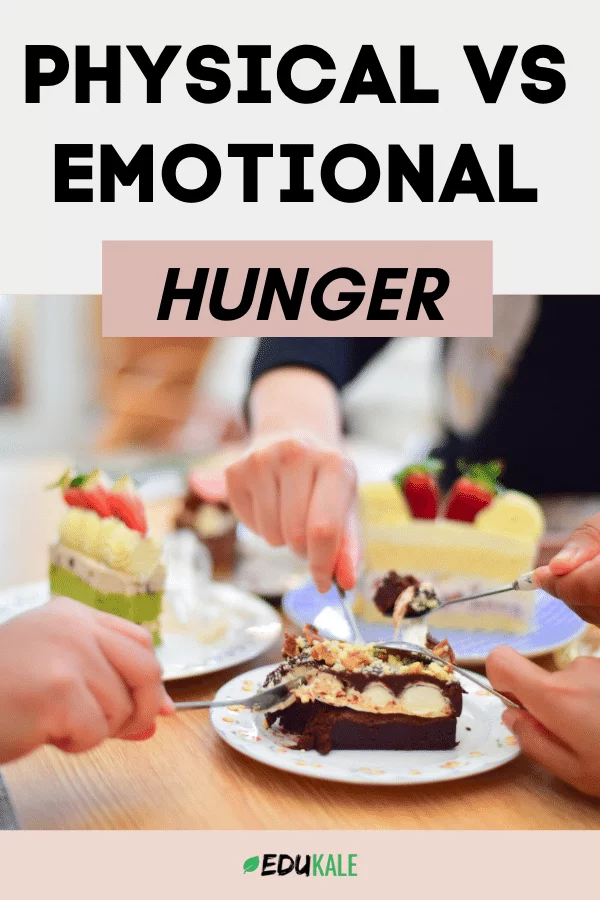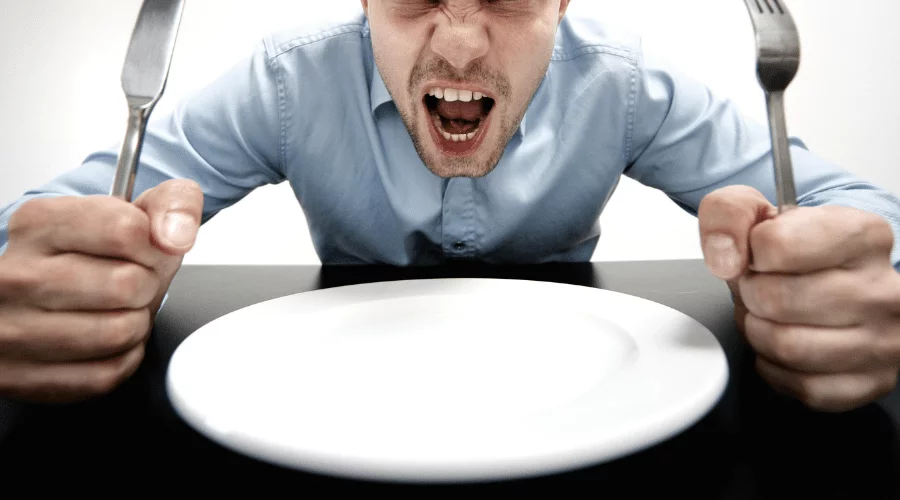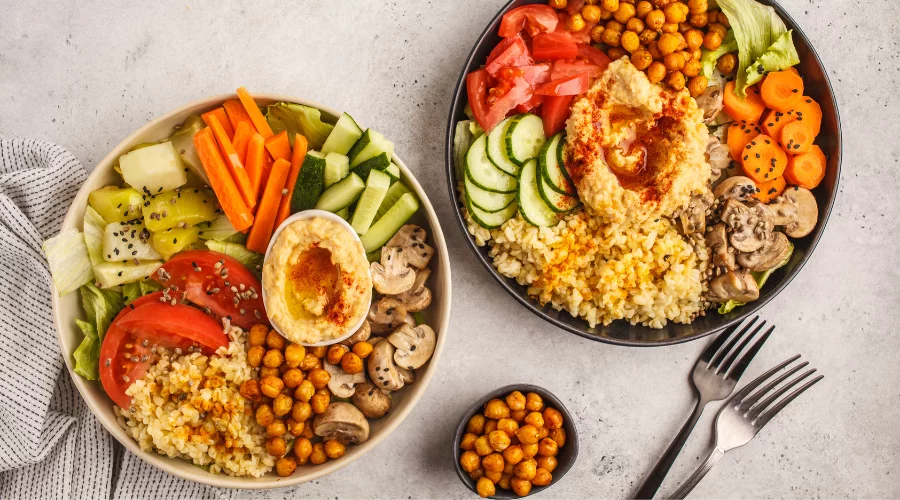Written by Lucie Villeneuve, nutritionist, M.Sc.
You may be aware that physical hunger is not the only type of hunger that exists. There are actually two main types of hunger: physical hunger vs emotional hunger.
How can you tell them apart?
And how can you deal with emotional hunger?

What is physical hunger?
Physical hunger is when your body is physically in need of food. It will let you know that with a sensation of emptiness in your stomach, growling or rumbling. You will feel like your energy levels are low, and these sensations will build up gradually over time.
It will start with a tiny feeling in your stomach that will gradually take up more and more space until you feel that if you don’t eat you’re either going to throw up or pass out. Hopefully, you’ll never let it get that far, but those are the signals of strong physical hunger.
Physical hunger is telling you that you haven’t eaten in a while and that your body needs nutrients and food to cover your basic needs. For a lot of people, physical hunger is the sole real, legitimate hunger that actually requires you to eat.
However, this isn’t true: while physical hunger is crucial, emotional hunger shouldn’t be left out either.

So what is emotional hunger?
Emotional hunger is when your desire for food is not linked to any physical signals. You know that you’re full or don’t need to eat, but you’re experiencing strong cravings and a desire to eat. You usually have an urge to eat something highly palatable, like sweets or junk food, that occurs pretty suddenly, without warning.
More than just a way to fuel hunger, eating becomes a coping mechanism to face certain emotions like sadness, boredom, stress, loneliness, etc. Many things can trigger emotional eating: a stressful workday, an argument with a loved one, a financial worry…studies [1] show that it is associated with perceived stress and worries.
Oftentimes, it is not associated with actual physical hunger… but it can be.
How to tell the difference between physical vs emotional hunger
Emotional hunger can hit you very suddenly and very intensely.
You often crave a specific food and feel an urge to satisfy that craving. This may bring you temporary comfort, but ultimately it often leads to feelings of guilt, shame, and regret.
On the other hand, physical hunger usually comes gradually and is accompanied by classic hunger signs (empty growling stomach, hunger pangs, low energy, headache, dizziness…) Usually it doesn’t involve craving a specific food and it goes away when you feel physically full and satisfied. It isn’t associated with any negative feelings either.
Why is it sometimes hard to tell them apart?
In an ideal world, you would be able to see that you are experiencing physical hunger and eat a healthy balanced meal, or you would realize that you are actually experiencing emotional hunger so you would do something else to cope with these emotions instead.
However, it can sometimes be very difficult to discern whether you’re feeling physical hunger or emotional hunger, and it’s totally possible for them to overlap.
Let’s say that you’ve had a very long day and that you didn’t have time to eat lunch. You had a ton of difficult meetings and when dinner time comes you’re exhausted and starving. You don’t feel like eating a healthy meal with veggies and quinoa, and you’re really craving a big fat pizza and ice cream for dessert.
In this situation, it’s really hard for you to say if you’re experiencing physical hunger or emotional hunger. Indeed, you have some of those physical hunger signs like the growling, empty stomach, the low energy, and the gradual feeling of hunger.
However, you’re also experiencing the emotional aspect of hunger, like a specific craving, an intense desire to eat comforting foods, and then feelings of guilt when you do finish that entire pizza and ice cream.

This overlapping of both types of hunger happens when you let one of them go on for too long without acknowledging it.
In the previous situation, if you hadn’t skipped lunched and had eaten when you were feeling the first signs of physical hunger, you would only have had to deal with your emotional hunger at the end of the day, and it would have been fine with a cookie and a movie instead of an entire pizza and tub of ice cream.
When this happens, try to cater to both your types of hunger in different ways. You can decide to have a healthy balanced meal to fuel your physical hunger and meet your nutrient needs, and also to have a small bowl of ice cream for dessert in order to satisfy your emotional cravings and feel comforted.
Addressing physical hunger
The first and most important step is to actually give your body the nutrients it needs. If you stick to three balanced and healthy meals a day and get in all of your macronutrients, it’ll be easier to spot when you’re eating emotionally and when you’re actually hungry. My article on healthy eating for beginners can definitely help with that.

With physical hunger, it’s also good to practice mindful eating and to use the intuitive eating scale. Mentally rate your fullness before, during, and after your meal, 1 meaning you’re starving and 10 meaning you’re full to the point of sickness.
Try to start eating around a 3, when you’re pretty hungry, but not starving, and try to stop when you are around a 7, meaning comfortably full and satisfied. Using this scale will help you be more comfortable with analyzing your hunger and fullness cues, and being able to discern when your hunger is actually physical.
If you aren’t able to use the scale, there’s likely emotional hunger involved.
How to deal with emotional hunger
Sometimes, we turn to eating simply because we are bored, lonely, sad, and don’t know what to do. We hope to find immediate pleasure and gratification from food. And, on some occasions, that’s ok.
Physical hunger isn’t the one true hunger that needs to be satisfied while others should be ignored. Food can absolutely be used as an emotional tool, and it can sometimes be a great way to celebrate positive emotions as well.
While eating can definitely be one way to cope with your emotions, it shouldn’t be the default way, or the only way. It’s important to learn other ways to do so as well. So try spending some time finding other ways to cope with your emotions.

You can try things like meditation, which has a lot of proven health benefits [2]. Take some time to work on yourself, lower your stress levels, improve your peace of mind, and care for your mental health by meditating.
Journaling can also be a great way to express your emotions, and can actually improve healing. Writing about emotional events results in improvements in both physical and psychological health [3].
You should also try to find other activities that bring you joy. I really suggest writing them down and keeping that list in an accessible place so you know your options when the emotional eating strikes.
Reading, watching a movie, dancing, roller-blading, playing video games, walking your dog, painting, listening to music, learning a new skill, seeing a friend, playing an instrument…
You can also read my article on how to overcome emotional eating if you want more tips on that.
Both physical vs emotional hunger are important to cater to. Learning to recognize them can make it easier to know which strategies to apply, but emotional hunger definitely shouldn’t be dismissed!
-Lucie

